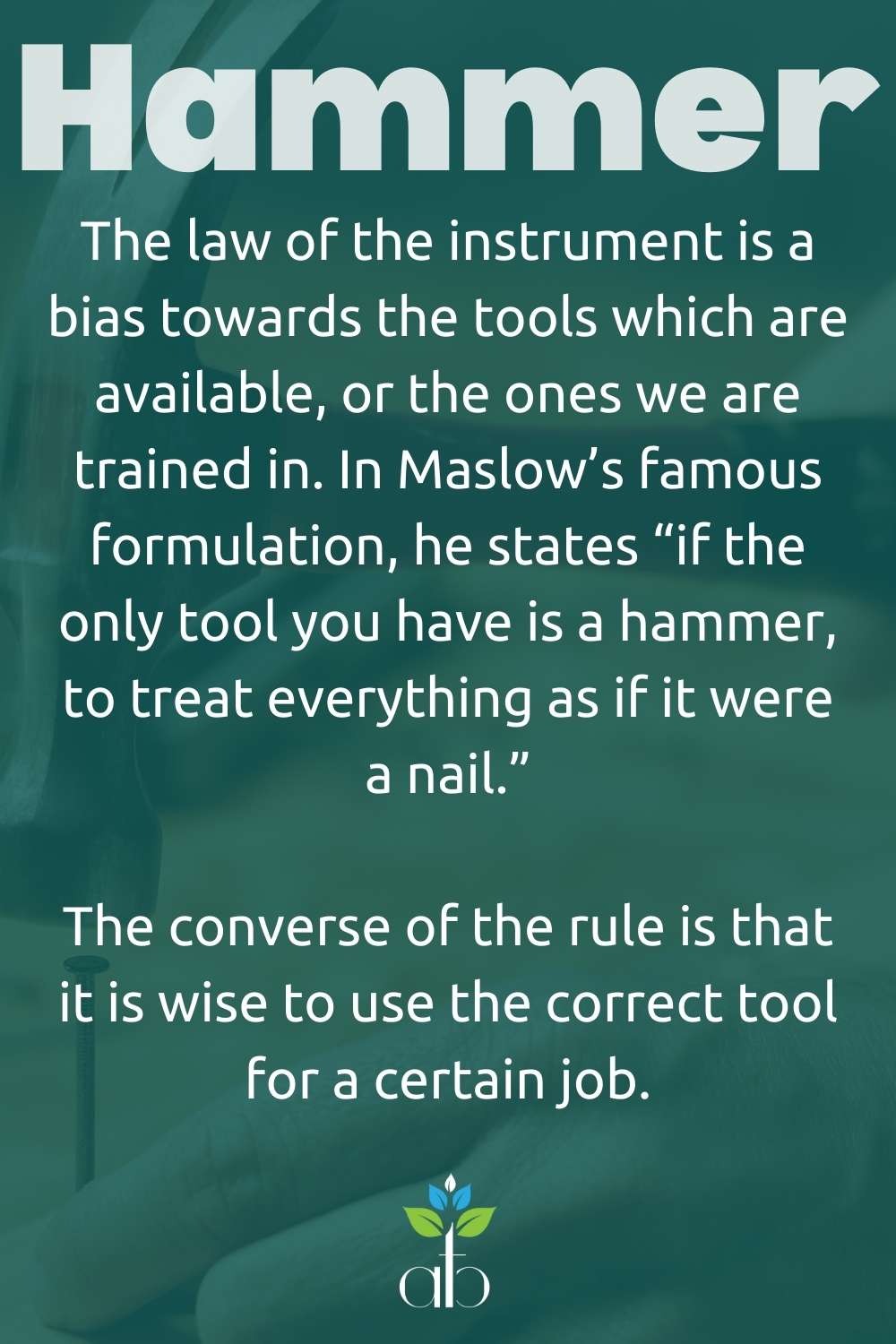Episode 266
The Law of the Instrument

The law of the instrument is a bias towards the tools which are available, or the ones we are trained in. In Maslow’s famous formulation, he states “if the only tool you have is a hammer, to treat everything as if it were a nail.”
This is also a lesson about what to expect as a buyer. If we ask the butcher what is good to eat, he will surely tell us that meat is good. If we ask a dentist how to solve our toothache, she looks to her drill. If we go to a psychiatrist with some mental unease, we may walk away with some drugs.
The converse of the rule is that it is wise to use the correct tool for a certain job.
Among new school poker players, it’s very common to hear them talk about maths, probability, or card ranges. Among old school cardplayers, it can be more common to hear them talk about intuition and gut feelings, or sensing the strength of a player’s hand. It’s very rare to find a player who uses both the technical and the intuitive sides of the game. If someone does, they might well become an excellent player.
Likewise, in our lives we can be discerning about when it is best to think things through with logic, and when it is best to go with our feelings.
Hosts & Guests
Kurt Robinson
Transcript
I was just thinking about the law of the instrument.
This is an idea that has been around for quite a long time. The most popularly formulated by either Abraham Kaplan or Abraham Maslow.
Of course Maslow famously wrote “When the only tool you have is a hammer everything begins to look like a nail.”
I do think this is not the only law of the instrument. I think the opposite of this law is that for a specific job the right tool.
So in many cases we might believe that the tools we have available are the ones that are appropriate to find a solution. For example in the psychiatric industry, one tool they have is psychotropic drugs and so they decide to use them very frequently without thinking there might be other possible solutions to the problem.
They even start to back this up with the broken brain hypothesis and say that is why we must use these tools because people have chemical imbalances and entire belief structures can be formulated around this when we want to justify the use of a particular tool.
The same thing applies in our own thinking process. I noticed a lot of the time playing poker, when I first started playing I didn’t know anything about the theory of the game. I didn’t understand the mathematics, I had some basic idea about probability.
When I began to play I played by feel. Sometimes I would have very interesting intuitions and get a sense of what cards were coming next. Or maybe a feeling from another player, perhaps a smell that they had a strong hand or concerned about me betting.
When I learned more about the theory of statistics in the cards, in some sense I started to leave those intuitions behind but its a rare player. The old school players would rely on intuition over feel and the new school players think a lot about math, statistics, what are they likely to have? Break it down and look at their previous play in this hand or previous hands.
Its a very rare player who can combine the use of intuition and the use of mathematics and logic and wonder if someones behavior is consistent.
There was a famous case, my friend Luis Fernando Mises sent me a video when I told him about a situation in my life. It was a video of Tim Cook. Im sure a lot have criticisms about Tim Cook but nevertheless the video is very interesting. What happens is Tim Cook is working at Compaq at the time, very successful. Huge company in tech.
He had the opportunity to go and work at Apple as CEO and when he put it on paper everything seemed to point to Compaq.
All his friends said “Oh of course keep working at Compaq. That’s a great career right now, you do very well working at Compaq.”
But he knew deep down even though he had done all the cost analysis that he could look at, even though he could see it made sense to keep working at Compaq he felt this drive of something deep within him telling him that Apple was a good thing for his career and he was right.
He had that courage, that unusual courage of going against what he knew logically. Sometimes we do have to put aside what we think we know, what we can figure out logically.
Sometimes things will not be resolved in a square matter. Sometimes the problems that we face are not normal ones, not ones we have been trained for. In that case we can give in a little to the mystery to start using tools that perhaps we didn’t know were within us. Start to use all of the tools we have at our disposal.

New Episodes Every Weekday
11am Mexico City time
10 min episodes Monday - Thursday
1 h interview episode on Fridays
As an Amazon Associate I earn from qualifying purchases.
Stay Beautiful &
Stay Connected
